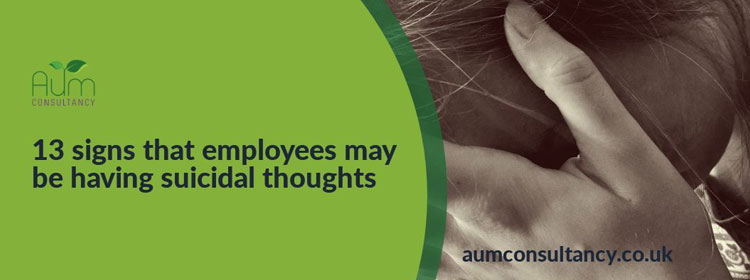The focus for this year’s World Mental Health Day is suicide prevention. According to the latest statistics from the Samaritans, over 6,500 people in the UK committed suicide last year, a rise of 11% on the figures for 2017. Perhaps surprisingly the highest rate is amongst men in the 45-49 age bracket. Indeed, men overall are three times as likely to take their own life than women.
Scary statistics, but suicide is something that is preventable. A key method of prevention is to spot the signs of somebody being at risk and give them the support they need. In the blog, we’re going to look at who is most at risk of suicide and how you, as managers and co-workers, can spot the signs of suicidal tendencies amongst employees and colleagues.
Risk factors
In the majority of cases, suicide isn’t down to one single factor. It is a complex combination of multiple issues going on in somebody’s life. Eventually, that person reaches their ‘final straw’ and wants to end everything.
The figures from the Samaritans tell us about the most at risk ages, but what else makes somebody more at risk of suicide?
Mental Illness: Around 30% of suicide victims in 2018 had been under mental health services in the previous year. The nature of the mental health illness ranges from bipolar to depression to schizophrenia, with plenty of others in between.
Sexuality: The risk of suicide amongst LGBTQ+ people is significantly higher than the national average. Even in 2019, bullying and harassment of the LGBTQ+ community still exists and with that comes an increased risk of self-harm.
Background: Wages, job role, housing, relationships, education et al. These can all be factors in increasing somebody’s risk of committing suicide. The greater the disadvantages in somebody’s background, the greater the risk of suicide.
Of course, far from everybody in the above categories will be having suicidal thoughts. It’s vital to remember that the risk factors associated with suicide are not the same as the warning signs.
Warning signs
The key to effectively managing employees who may be feeling suicidal is to look out for the warning signs. This isn’t an easy thing to do, most people suffer in silence and deny they have suicidal feelings. Plus, if somebody has been suffering for a long time, then you may not notice any changes in their behaviour. Nevertheless, you can look for the following 13 signs that a member of staff is struggling and potentially feeling suicidal.
Please note – these signs do not necessarily mean that somebody is feeling suicidal, but they are signs of somebody who is struggling, needs help and maybe feeling suicidal:
- Mood swings – Is a worker happy and joking one minute, then silent and detached the next? Having emotional peaks and troughs is often a sign that somebody is deeply unhappy.
- Agitation – Does a colleague appear restless and seems easily aggravated or annoyed? This often indicates that a person is struggling.
- Anger – Do you know any employees who seem to get overly or disproportionately angry at seemingly minor events?
- Reckless behaviour – Has somebody in the office started being hostile to colleagues and developed a lack of care about perception?
- Self-harm – Obviously this isn’t easy to spot, but lookout for any suspicious marks on employees arms or legs. Self-harm is sometimes a prelude to suicide.
- Alcohol abuse – Is a certain member of staff making more than the occasional lunchtime trip to the pub? Are they telling everyone about what bar they are going to after work every day?
- Eating patterns – Unhappiness can have one of two impacts on a person’s appetite. Either they start overindulging and eating junk food for much of the day, or they do the complete opposite and stop eating almost entirely. Both are signs of deep unhappiness.
- Lethargy – Does a member of the team seem to have lost all their energy and desire to succeed. Did they used to be a fountain of ideas but have recently taken to just going through the motions?
- Poor performance – An extension of the above. Is a previously high performing individual now producing below-par work? Are they not performing as well as you know they can?
- Punctuality – An increase in absenteeism and/or regular lateness can be signs of unhappiness. Look out for members of staff who display either or both of these tendencies.
- Lack of concentration – Does a member of staff seem to drift off during meetings or lose interest when you’re explaining something to them?
- Withdrawing from colleagues – Does a previously sociable coworker suddenly lose interest in nights out and social events? Have they stopped contributing to team activities?
- Procrastination – Is somebody’s pile of incomplete work piling up? Is the list of unfinished projects getting larger by the week?
It’s worth remembering that not everybody with suicidal thoughts will display any of these tendencies, but it’s highly useful to be aware of them and to look for signs amongst employees.
What to do
If you do think that an employee is displaying strong signs of suicidal tendencies, then the worst thing you can do is nothing! Don’t be afraid to just ask he or she how they are feeling and listen to their thoughts. If that doesn’t completely allay your fears then follow suggest they contact your company’s Employee Assistance Programme or failing that HR or an external service. Try to make sure that action has been taken – either by following up with the person in question or by checking with your HR department.
Managing mental health amongst colleagues is imperative. At Aum Consultancy we offer a range of relevant courses that can help your business stay on top of this big issue. These courses include:
Managers Managing Stress – The training course will enable managers to fulfil their legal duty in protecting the well-being of their employees at work. Hence, enhancing their productivity and profits.
Mental Health Awareness– This training course will help you develop and apply skills in addressing minor and major MH issues at work
Get in touch for a stress-free and successful way of life.

